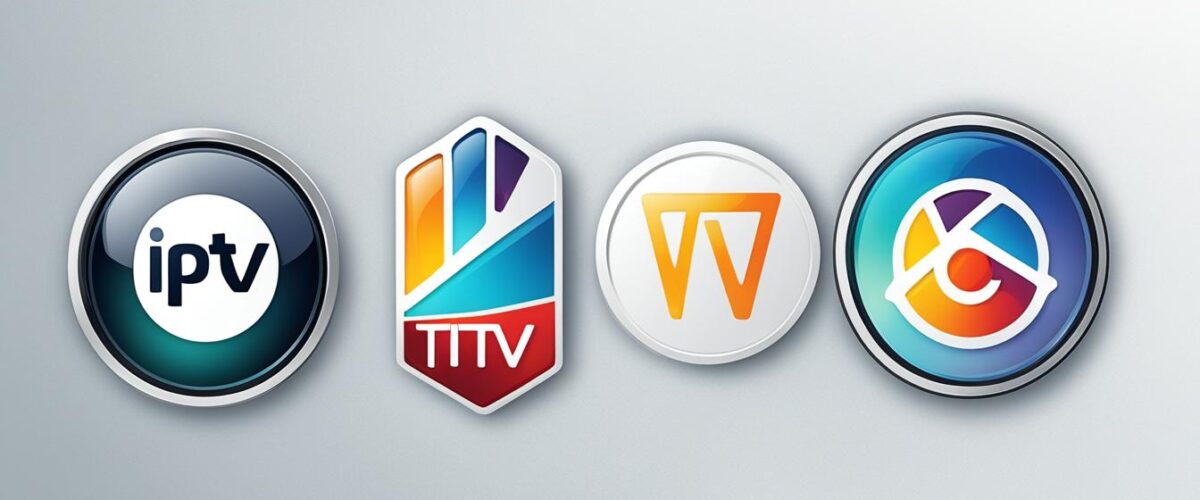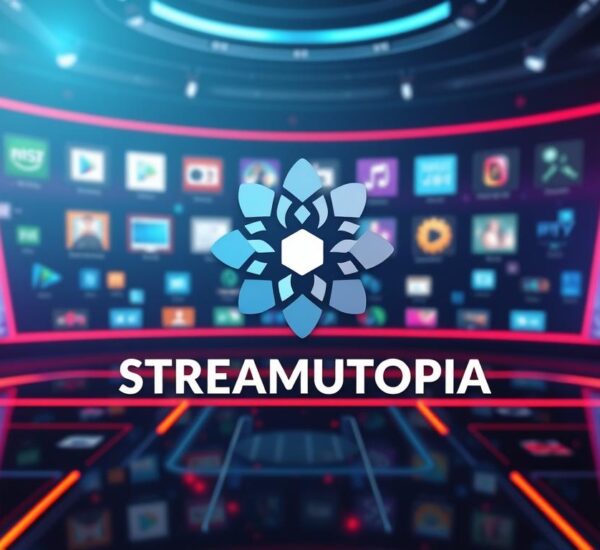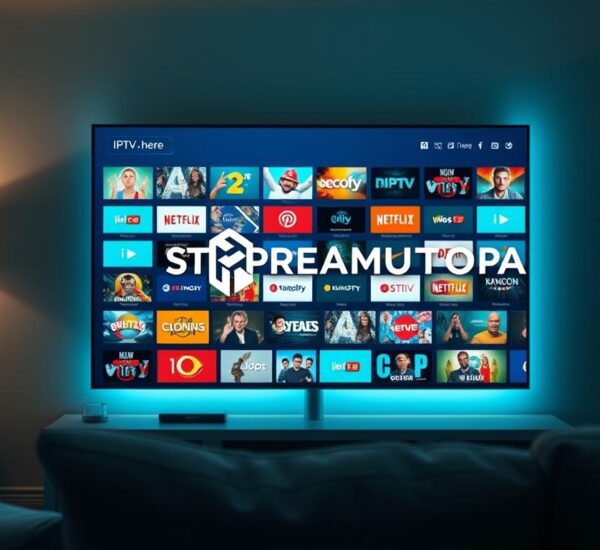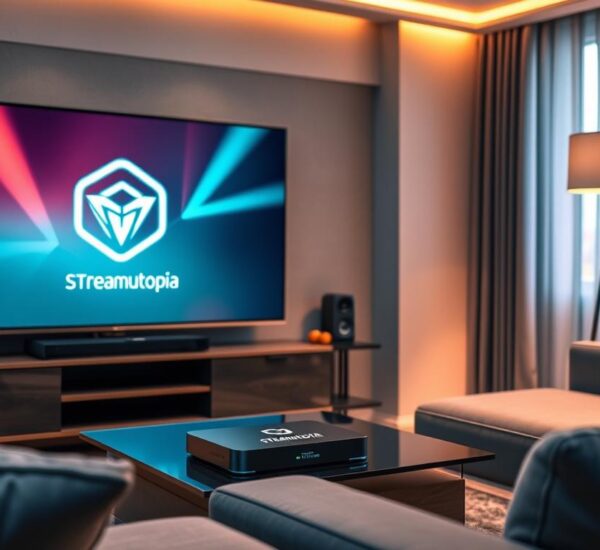Is traditional TV still the best choice, or should we look to IPTV for the future of entertainment? With over 40% of city homes choosing IPTV over old TV1, it’s key to know the good and bad of each. This piece will explore IPTV and traditional TV, helping you pick what suits your viewing best.
Key Takeaways
- IPTV’s user engagement has surged by 15-20% when compared to traditional broadcast models1.
- The OTT video market is projected to reach $295.40 billion by 2024, indicating a robust growth in streaming services1.
- While traditional TV faces a projected 26% decline in penetration by 2030, IPTV continues to gain traction1.
- Top IPTV services like DIGIBOX and SUPERBOX provide expansive channel selections, enhancing viewer choice2.
- Environmental concerns and sustainability are becoming increasingly relevant in the IPTV versus traditional TV discourse3.
Introduction to IPTV and Traditional TV
The Introduction to IPTV shows how it brings TV over the internet. It lets users watch live and on-demand shows. This is different from Traditional television overview, which uses cable or satellite.
IPTV gives users lots of choices, like many TV channels, movies, and series from all over. You can watch this on phones, tablets, and smart TVs. It also has cool features like pause and rewind4. Traditional TV offers good signal and picture quality but has limited viewing times5.
Both IPTV and Traditional TV have their own benefits. IPTV is great for watching shows when you want. Traditional TV is good for local channels that bring news and events to communities5. Also, cable and satellite can be more expensive than IPTV6.
Understanding IPTV Technology
IPTV has changed the way we watch TV by using the internet for streaming. It’s a new way to get TV shows and movies online, unlike old broadcast methods.
Definition of IPTV
IPTV stands for Internet Protocol Television. It lets users watch TV shows and movies over the internet. This includes live TV, video on demand, and time-shifted TV. It’s part of how we watch TV today7.
How IPTV Works
IPTV sends TV shows through the internet in real-time. It uses a secure connection to deliver content. Users can easily find their favorite shows on servers7. The technology behind it manages the internet speed for a smooth watch7.
With 4K and HDR, IPTV offers great quality. But, it faces issues like video quality and piracy. Still, the IPTV market is expected to grow fast, reaching $188.66 billion by 20328. IPTV also offers different subscription plans for everyone8.
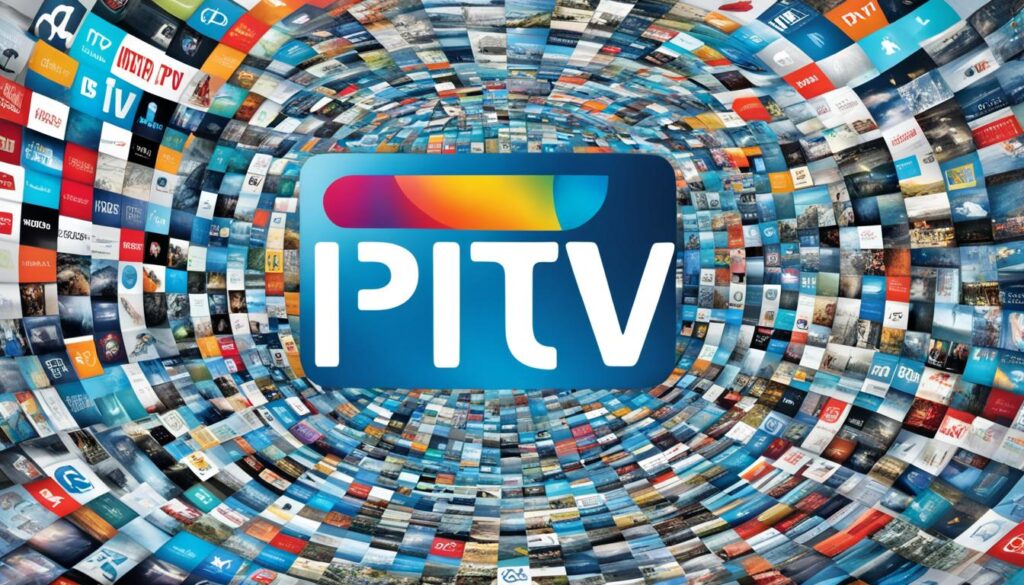
| Aspect | IPTV | Cable TV |
|---|---|---|
| Accessibility | Requires only an internet connection | Requires physical link to homes |
| Content Customization | Customizable plans with affordability | Additional costs for specific channels |
| Streaming Quality | HD and 4K available | Reliable but limited by infrastructure |
| Device Compatibility | Supports smartphones, tablets, laptops, smart TVs | Primarily limited to televisions |
| Market Trends | Growing demand with flexible plans | Stagnation in subscriber growth |
The Rise of Traditional TV
Traditional TV, through Cable and Satellite television, has been a big part of our entertainment for years. These platforms offer many channels and shows for a broad audience. But, they can be less flexible and more expensive.
Overview of Cable and Satellite TV
Cable and Satellite TV have been leaders in entertainment. Cable TV is famous for its wide range of local and premium channels. Satellite TV also provides similar content. Yet, they find it hard to match IPTV’s flexibility and variety.
History and Evolution of Traditional TV
Television started in the mid-20th century with broadcast TV, changing media forever. Since then, Traditional TV has seen many changes. Innovations like color TV, remote controls, and digital broadcasts have changed how we watch TV.
These changes have helped Cable and Satellite TV stay popular. As technology advances, traditional TV keeps up, even as IPTV changes how we watch content today.
Traditional media is still evolving. Studies show that over 75% of traditional TV viewers like the steady streaming quality9. On the other hand, 38% of IPTV users face issues like buffering during busy times9. These facts show Traditional TV’s lasting importance in today’s fast-changing media world10.
IPTV vs. Traditional TV: Comparing Pros and Cons
When comparing IPTV and cable, we see clear benefits of IPTV and drawbacks of traditional TV. IPTV brings content in HD and 4K, giving a clearer picture than old TV methods1112. It offers a wide range of channels, movies, and series, letting viewers pick what they like11.
Traditional cable TV, however, sticks you to a set list of channels with little choice. It may be stable but can be pricey due to extra fees12. IPTV is gaining fast, growing by 30% to 35% yearly, and has over a billion users12. This shows people are choosing IPTV for its flexibility and savings.
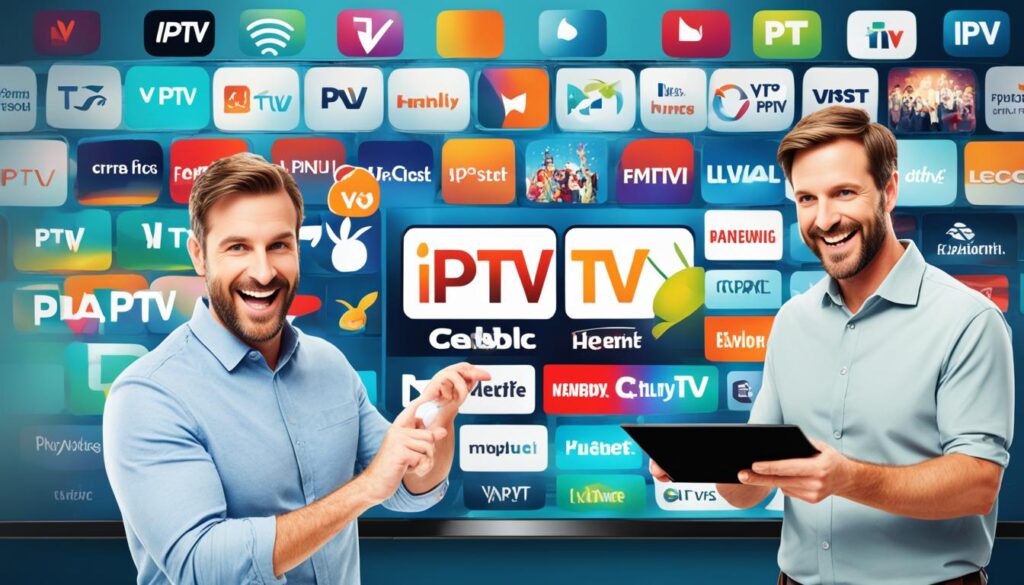
| Feature | IPTV | Traditional TV |
|---|---|---|
| Content Variety | Extensive with customizable packages | Fixed range of channels |
| Quality | HD and 4K available | Variable quality |
| Viewing Flexibility | Stream multiple programs simultaneously | Limited to scheduled programming |
| Cost Structure | Lower costs with fewer hidden fees | Higher costs with many hidden fees |
| Market Growth | Growing rapidly | Stable but declining |
Cost Comparison: IPTV vs. Traditional TV
It’s important for consumers to know the costs of IPTV and Traditional TV before choosing. IPTV subscription costs are often lower than Traditional TV fees, which can have extra charges.
Monthly Subscription Fees
IPTV offers affordable pricing with clear packages. Studies show 70% of people pick their entertainment based on cost when choosing between IPTV and traditional cable13. IPTV lets you sign up without a long-term contract, avoiding unexpected costs. Traditional cable, however, can be more expensive with long-term contracts and Traditional TV additional charges that add up13.
Hidden Charges and Fees
Hidden fees are a big worry for those picking between IPTV and traditional TV. Traditional TV often has extra costs for setup and renting equipment, making the initial price go up. IPTV, though, is more upfront about its costs, which is why 80% of its users prefer it over traditional cable13. By combining internet and TV, IPTV users can save money and watch shows without hidden fees or extra charges14. This shift towards IPTV is because it’s more cost-effective and easy to use15.
Flexibility and Customization
In today’s world, we all like different things, and IPTV offers a way to make watching TV personal. Unlike traditional TV bundles, which try to fit everyone into one package, IPTV customization lets you make your own viewing experience. You can pick the shows and movies you love, making it more fun and engaging.
IPTV’s Customizable Packages
IPTV services have many Flexible IPTV packages that let you choose the channels you like. This means you can save money by not paying for channels you don’t watch. With IPTV, you can pick the channels that really matter to you, unlike traditional cable TV which often forces you to take a bunch of channels you don’t want16.
This flexibility makes it easy to watch your favorite shows on different devices like smartphones, tablets, and smart TVs17. It’s all about making watching TV easy and fun, just the way you like it.
Traditional TV Bundle Limitations
Traditional TV bundles often make you pay for channels you don’t watch, which can be a waste. Cable TV might offer local shows, but it’s not as interactive or customizable as IPTV. Setting up IPTV might need some tech knowledge and costs for devices, but the benefits of a personalized viewing experience are worth it14.
Overall, IPTV’s flexibility is a modern answer to the old ways of watching TV. It gives you the power to watch what you want, when you want it.

Content Variety: What’s Available?
In today’s digital world, IPTV’s extensive channel selection stands out. It offers many IPTV channel options for different tastes. You can watch international channels, specialized content, and sports from all over the globe. This means you can easily find something you like and enjoy on-demand shows too.
IPTV’s Extensive Channel Selection
IPTV uses a special network for high-quality video streaming. This means fewer interruptions compared to other platforms. It lets IPTV providers offer live channels and scheduled shows, just like regular TV but with more choices.
Limitations of Traditional TV Content
Traditional TV has big Traditional TV content limitations because of channel restrictions. Cable and satellite systems limit what you can watch. Even with hundreds of channels, you might not find what you really want.
This lack of variety could push viewers to try IPTV for more choices. IPTV offers a wider range of content than traditional TV.
With new technology and changing tastes, IPTV is becoming more popular. It’s important for viewers to consider switching to IPTV for more options1819.
Quality of Streaming: IPTV vs. Traditional TV
When we look at IPTV and traditional TV, the streaming quality is key. IPTV often tops traditional TV in resolution, offering HD and even 4K content. Traditional TV’s quality depends on the viewer’s infrastructure and signal strength. This means it can be affected by signal interruptions, which can ruin the viewing experience.
Streaming Resolution and Quality
IPTV streaming quality is impressive, with many channels in high definition. Services like Hulu and YouTube TV even offer 4K options. This is a big difference from traditional TV, where quality can drop off over distance or during busy times.
Buffering Issues with Each Option
Buffering can be a problem with IPTV, especially if your internet is slow. You need fast internet to avoid interruptions. Traditional TV has fewer buffering issues but can still have pixelation during busy times. This shows that while traditional TV is less prone to buffering, it’s not completely free from signal quality problems.
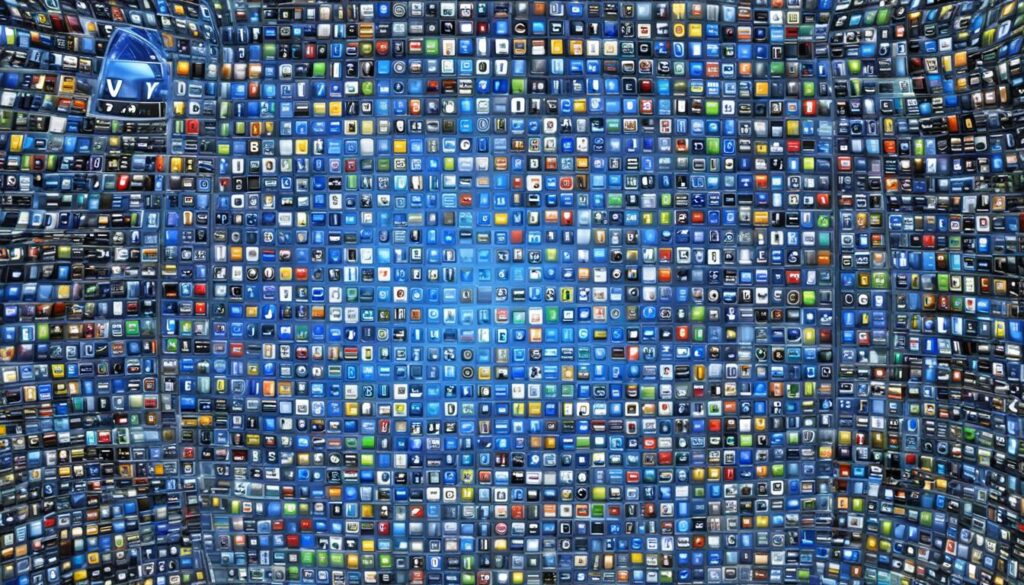
Modern IPTV boxes offer hundreds of live TV channels and a big library of on-demand content. They also have cool features like pausing live TV and scheduling DVR recordings. As technology gets better, IPTV services like StreamUtopia become more appealing, especially with their wide range of live and on-demand content designed for today’s entertainment needs.
| Service Type | Resolution | Buffering Potential | Features |
|---|---|---|---|
| IPTV | HD/4K | Dependent on Internet Speed | Live TV, DVR, On-Demand |
| Traditional TV | HD | Less Buffering, Susceptible to Interference | Limited DVR, No On-Demand |
Knowing these differences helps viewers make better choices. As streaming options grow, IPTV might offer even more flexibility and quality. This could change the game for traditional TV2021.
Technology and User Experience
Television services have changed a lot, especially how we use our devices. IPTV user interfaces make it easy to find and watch shows. They solve common problems with TV interfaces. You can set them up to match your own tastes, making watching TV better for everyone.
User-Friendly Interfaces of IPTV Services
IPTV services have easy-to-use interfaces. They let you quickly look through lots of channels, like over 16,000 live TV options from Fubo IPTV and others. You can search fast and get recommendations that fit your interests. This makes watching TV more fun and keeps you hooked on your favorite shows.
Traditional TV Remote Control Limitations
Old TVs have remotes that are hard to use, leading to problems. People find them clumsy and annoying. Switching channels can be a big hassle, as people spend a lot of time looking for something good to watch22. This makes users unhappy and shows the need for better TV technology.
The gap between IPTV and traditional TV is clear as TV changes. IPTV is seen as a modern, efficient choice. Traditional TV is struggling with its old ways, showing IPTV’s advantage in making watching TV better23.
IPTV Features that Enhance Viewing
IPTV services are changing how we watch shows by offering special features. These features make watching content better. One great thing about IPTV is how easy it is to find lots of shows and movies to watch anytime you want. This lets you watch what you like, when you like it.
On-Demand Content Accessibility
IPTV lets you watch a huge variety of shows, including movies, series, and special programs not on regular TV. You can pick when to watch, making it more fun. There are many subscription plans that let you choose what you want to watch, making it easy to find something you like24.
Multi-Screen Viewing Options
Many IPTV services also let you stream on multiple devices at once. This is great for families or friends who want to watch different shows together. Services like Hulu + Live TV offer lots of channels and work on many devices, from smart TVs to tablets25. This shows how IPTV technology is getting better, making it a top choice for viewers who want more variety.

IPTV combines on-demand shows with the ability to stream on many devices. This makes it a strong option in today’s entertainment world. As people enjoy these features, the demand for them grows, making IPTV a key player in media26.
Traditional TV Limitations and Drawbacks
Traditional TV systems have big problems because they rely on old technology. They need cable or satellite to work, which is hard to get in some places. When the weather is bad, these systems often break, making people unhappy. The limitations of cable/satellite can cause problems with watching TV smoothly.
Reliance on Cable or Satellite Infrastructure
Traditional TV depends a lot on cable or satellite systems. This means it’s not always available everywhere, especially in the countryside. People in these areas often have trouble watching their favorite shows because of this.
Program Timing Restrictions
Traditional TV has a set schedule that viewers can’t change. This means you can’t pause or go back on live shows. This is different from IPTV, which lets you watch shows whenever you want.
| Aspect | Traditional TV | IPTV |
|---|---|---|
| Infrastructure | Relies on cable or satellite | Internet-based, accessible anywhere |
| Flexibility | Fixed programming schedule | On-demand content access |
| Device Access | Limited to specific devices | Accessible on multiple devices |
| Interactivity | No pause/rewind features | Full interactivity available |
Traditional TV and IPTV are very different. Traditional TV has a hard time keeping up with what viewers want. As more people watch TV on different devices, Traditional TV needs to change to stay relevant2728.
Environmental Impact of IPTV and Traditional TV
Traditional TV and IPTV have big differences in how they affect the environment. Traditional TV uses a lot of energy and creates a lot of waste. This is because it needs a lot of hardware and relies on satellites.
Carbon Footprint of Satellite Systems
Satellite TV sends signals through space, which is good for areas without cables. But, it uses a lot of energy. This means it’s not very good for the planet.
IPTV’s Role in Sustainability
IPTV uses fiber optic technology, which means it can send high-quality TV without using many physical parts. This means less waste and less trouble from bad weather. IPTV is better for the planet because it uses the internet we already have.
More people are using voice, data, and TV over the internet. This shows IPTV is a good choice for watching TV in a way that’s good for the planet. By picking IPTV, people help make TV less bad for the environment. This move towards IPTV shows we want to watch TV in a way that’s better for the earth.IPTV vs. Traditional TV: Pros & Cons293031
Future-Proofing: Which Is More Sustainable?
The future of IPTV looks bright thanks to its ability to grow and adapt with technology. It’s not like Traditional TV, which has a hard time adding new features. IPTV can easily bring in new services, keeping viewers interested.
IPTV’s Scalability and Adaptability
IPTV systems can be updated easily without making users wait. This means they can offer lots of new features that people want. Hotels using IPTV often see happier guests because of the many shows and movies available32. Also, more people want better entertainment options in their rooms, showing how viewer habits are changing32.
The Decline of Traditional Broadcasting
On the other hand, Traditional TV is losing ground as fewer people subscribe to it. It’s hard for it to keep up with new tech and what viewers want. Now, cable TV is adding more services like video on demand and internet access33. The mix of telecom and media companies shows that traditional TV is falling behind, leading to slow growth33.
In short, IPTV is leading the way in the future of broadcasting thanks to its flexible setup. Traditional TV is struggling to keep up with streaming trends and losing viewers.
Conclusion
IPTV is changing how we watch TV. It’s getting more popular and offers a flexible way to watch shows and movies. IPTV is cheaper and easier to use than old cable or satellite TV342>.
It has a wide range of content, including live TV and shows you can watch anytime. This lets viewers pick what they like to watch, unlike traditional TV’s fixed channels34.
IPTV uses the internet, so it’s easy to set up and you can watch anywhere. Traditional TV has its perks, like staying on during bad weather. But IPTV’s ease and advanced features make it a great choice34.
In the end, IPTV looks like the future of TV. People can now pick plans that fit their viewing habits. This ensures they get the best streaming experience possible35.
FAQ
What is IPTV?
How does IPTV work?
What are the main benefits of IPTV?
What are the drawbacks of Traditional TV?
Are there hidden charges with Traditional TV?
How does the content variety differ between IPTV and Traditional TV?
Which service provides better streaming quality?
What are the users’ experiences like with IPTV interfaces?
Can I watch on multiple devices with IPTV?
How do environmental impacts differ between the two services?
Is IPTV more adaptable to future technologies?
Source Links
- MODA IPTV • Difference between IPTV and traditional broadcasting : best iptv – https://modaiptv.store/best-iptv-5/
- The Ultimate TV Box Showdown: Digibox vs. Superbox vs. vSeeBox vs. Mag – https://digiboxtv.co/blogs/posts/the-ultimate-tv-box-showdown-digibox-vs-superbox-vs-vseebox-vs-magabox
- Roku vs Firestick vs Chromecast in 2024 [TV Device Showdown] – https://www.cloudwards.net/roku-vs-firestick-vs-chromecast/
- 1. Introduction – https://medium.com/@plustvbox8/1-introduction-5361fdeb0bd9
- Traditional TV vs. IPTV – https://medium.com/@reidtaylor904/traditional-tv-vs-iptv-80eeb9723ba6
- What is IPTV? How IPTV works? Best IPTV Devices, Services, and more! – https://www.muvi.com/blogs/what-is-iptv-how-iptv-works/
- IPTV vs OTT: Key Differences and Choosing the Right Option – https://www.enveu.com/blog/iptv-vs-ott/
- What Is IPTV: How It Works, Types, Pros, & More – https://www.redswitches.com/blog/what-is-iptv/
- The Dichotomy: Traditional TV vs. IPTV – https://medium.com/@reidtaylor904/the-dichotomy-traditional-tv-vs-iptv-a25da41f1565
- IPTV vs. Cable TV: Which is better? – GeeksforGeeks – https://www.geeksforgeeks.org/iptv-vs-cable-tv/
- IPTV vs. Traditional Cable: Pros and Cons – https://medium.com/@ryansteen/iptv-vs-traditional-cable-pros-and-cons-872d09746d42
- What is IPTV? The Best IPTV Guide and Benefits of IPTV – https://blog.webnexs.com/what-is-iptv-the-best-guide-and-benefits-of-iptv/
- Comparison Between IPTV and Traditional Cable Television – https://www.iptvsmarters.com/a-comparative-analysis-iptv-versus-traditional-cable-television-services-in-todays-era/
- IPTV vs Cable TV vs Satellite: Pros & Cons Guide – https://iptvsnake.com/iptv-vs-cable-tv-vs-satellite-pros-cons-guide/
- IPTV vs. OTT – Internet TV Explained – https://corp.kaltura.com/blog/iptv-ott/
- A Comprehensive Comparison – BAY TV – https://baytelevision.com/iptv-vs-traditional-cable-tv-a-comprehensive-comparison/
- Trotons Tech Magazine Unveils Difference Between IPTV vs Cable TV – Space Coast Daily – https://spacecoastdaily.com/2023/08/trotons-tech-magazine-unveils-difference-between-iptv-vs-cable-tv/
- Cable, Satellite, IPTV & OTT Streaming: What’s the Difference? – BroadbandNow – https://broadbandnow.com/report/cable-vs-satellite-vs-iptv-vs-ott-streaming
- OTT vs IPTV – What are it’s Best Differences in 2023 – https://blog.flicknexs.com/ott-vs-iptv-choosing-your-perfect-entertainment-companion/
- Whats is Different Between OTT Box and IPTV Box? – https://www.mecool.com/blogs/news/whats-is-different-between-ott-box-and-iptv-box
- The Best Live TV Streaming Services for 2024 – https://www.pcmag.com/picks/the-best-live-tv-streaming-services
- What the future of TV will look like and who creates this future? – https://broadvision.infomir.eu/en/one-screen-is-not-1-issue/
- 10 Best IPTV Service Providers Subscriptions (Top Picks) – https://www.geeksforgeeks.org/best-iptv-service-provider-subscriptions/
- IPTV: Discovering a New Way to Watch TV – https://usawire.com/iptv-discovering-a-new-way-to-watch-tv/
- Top IPTV Providers for Live TV – GeeksforGeeks – https://www.geeksforgeeks.org/top-iptv-providers-for-live-tv/
- Maximizing Your Viewing Experience- Tips for Setting Up Your IPTV Box.pdf – https://www.slideshare.net/slideshow/maximizing-your-viewing-experience-tips-for-setting-up-your-iptv-box-pdf/269785277
- Glo TV IPTV vs. Traditional Cable TV – Pros and Cons – https://fliphtml5.com/rrxss/zsse/Glo_TV_IPTV_vs._Traditional_Cable_TV_-_Pros_and_Cons/
- Exploring IPTV’s Impact on Traditional Cable and Satellite TV – aerostreams – https://aerostreams.com/2024/01/08/exploring-iptvs-impact-on-traditional-cable-and-satellite-tv/
- How an IPTV TV System compares to Cable, Satellite, and OTT – Nevron – https://nevron.eu/blog/iptv-system/
- Internet Protocol television – https://en.wikipedia.org/wiki/Internet_Protocol_television
- Is Digital Signage Eco Friendly? – TelemetryTV Blog Post – https://www.telemetrytv.com/posts/is-digital-signage-eco-friendly/
- The Future of Hospitality: Exploring the Rise of IPTV in Madinah Hotels – https://medium.com/@alimtedaduae/the-future-of-hospitality-exploring-the-rise-of-iptv-in-madinah-hotels-8ec8d709f316
- The future of cable TV: Trends and implications – https://www.itu.int/dms_pub/itu-d/opb/gen/D-GEN-EUROPE.01-2018-PDF-E.pdf
- IPTV vs Satellite tv: What Are The Distinctions & Which To Buy? – https://www.lemmymorgan.com/iptv-vs-satellite-tv/
- What is IPTV? Discover the Ultimate Guide to Modern TV Streaming – BlueAngelHost – Official Blog – https://www.blueangel.host/blog/what-is-iptv/
